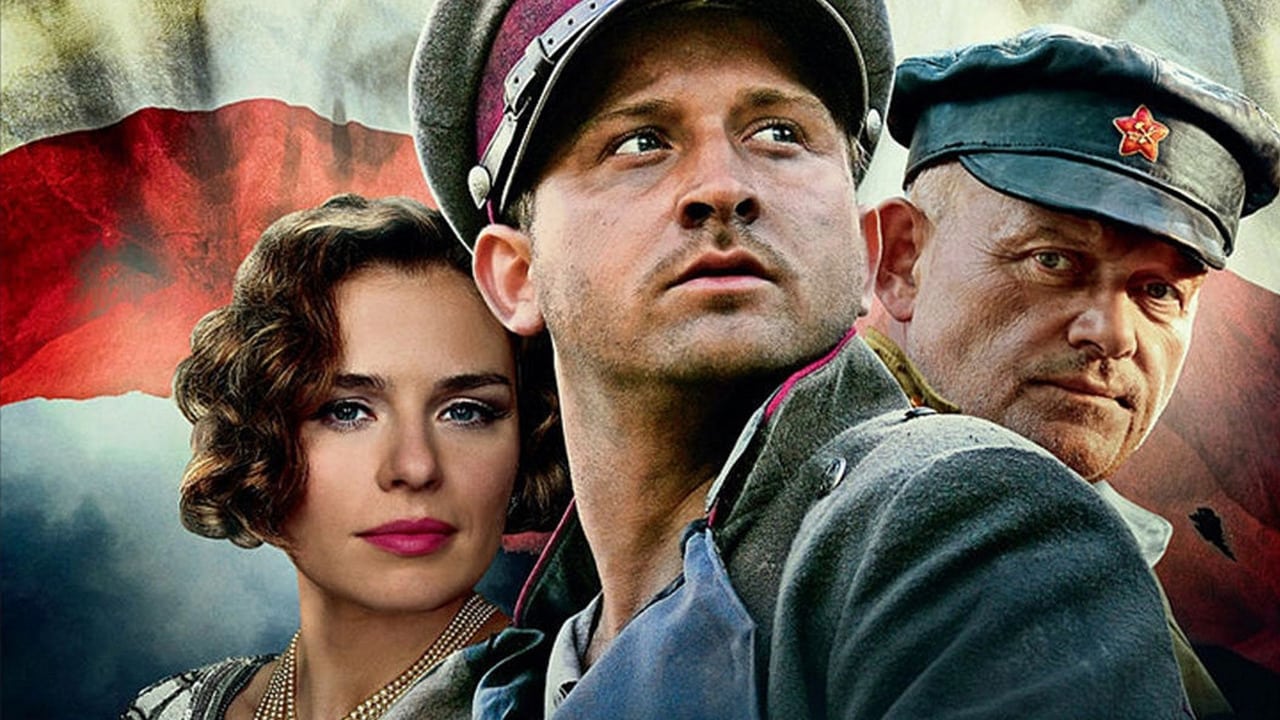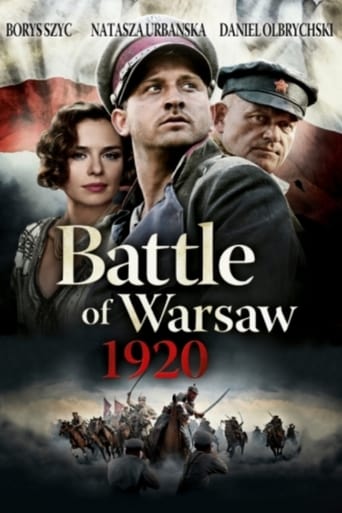

Don't listen to the Hype. It's awful
... View MoreA bit overrated, but still an amazing film
... View MoreThe movie's neither hopeful in contrived ways, nor hopeless in different contrived ways. Somehow it manages to be wonderful
... View MoreThe film's masterful storytelling did its job. The message was clear. No need to overdo.
... View MoreI am deadly sure that thirty or forty years ago, this film would have looked the same; and I don't speak here of the special effects. OK, I agree that the Varsovie battle that took place in those years - 1918 - was not very known of the western audiences, but I know that the movies made in the fifties or sixties in Poland did not look like this one. There were more drama lines in them and most of all not those f...happy endings destined for silly and squeamish audiences. We unfortunately find the same problem with Russian, Korean and other countries films, especially war films, maybe not dramas or crimes, which remain very specific to the genuine culture and traditions. But concerning war movies, all look like American ones, and mostly since the PRIVATE RYAN era. Meaning the most realistic scenes battles. Forget it, or only for the historical point of view which may be rather accurate. At least I hope...
... View MoreChina and Poland, both are not strange to the Soviet of Russia, but the differences on film-art to the similar experiences are very distinct. The Polish film of 2011, Battle of Warsaw 1920, is better than all Chinese films on the same subject of war. Mr. Hoffman is an eminent film-director.Bolshevik(Social Democratic Party) of Russia, after seizing power through "October Revolution of 1917" by lie and instigation, made peace with the Central Powers at March of 1918 by expense of very huge nation-interest, then concentrated robbery and slaughter within Russia, and quickly launched war against other nations in the name of "liberate the people of the world". The Polish-Soviet war took place between February of 1919 and March of 1921, eventually ended with defeat of the Soviet-Russia. The Battle of Warsaw was took place at August of 1920, which is the historical background of this film.The film has a main storyline about invasion and anti-invasion, besides, there is another sub-line, which is the love story of Jan Krynicki and Ola Raniewska, but that's not like what some people imagine. Jan Krynicki is an officer of Polish army who had some illusion to the propaganda of Bolshevik, after experiencing a life with an officer of Cheka, Jan said to him, "you've cured me." This sub-line is very necessary, which, appears to me, is just where Hoffman's more excellent than others ordinary. Soviet-Russia claimed its invasion is not an invasion but to liberate the proletarian from capitalist of another nation, to give them freedom, how great these saviors! But it's not true, on the contrary, communist-tyranny is the most evil and most skillful institution in the human history so far. In the beginning, the communists instigated the lower class to destroy the higher class in one society, which not only the main property owners but also naturally those who holding knowledge and wisdom came from; they mocked all true honor and virtue, then labeled all mean human nature as merit. The maintenance of communist-tyranny is not a myth, it just only declared that the right of property is a shameful and corrupt matter, because they always can find some instances. After stimulating the passion of envy and revenge of the slaves(proletarian), communism must evoke strong response, and let those who dare to think the proper property institutions overwhelmed by the stupid crowd-sea. In the process of human freedom supported by aristocracy superseded by that supported by the lawyer-class is there a large gulf. The communism advocators well know that the intellectuals would become whores as long as cleaning out the base on which they live, they have no choice but only to flatter the tyrants or amuse the popular; and when few of them are aware of this shameful position one day, who would realize the worldly base on which the righteousness depends has already been dismantled. By that time, the whole society has fallen into the deep mud-pit, suffering the mischief of despotism without end, and can hardly find a way out of this disaster.
... View MoreThe movie plays out like a bad "Winnie The Poo" episode - but with a lot of fireworks. There are some great performers here; a beautiful woman, handsome hero; and great, colorful costumes, horses, and all the spiel that comes with making a big-budget-movie. However, as it usually is the case with Polish cinema, the movie (as a whole) falls short. It falls short unable to decide whether it wants to be a slapstick comedy or a serious, patriotic war hymn.The cinematography is great. Natasza Urbanska is beautiful, graceful, and not a bad actress either. But the first half of the movie is very choppy, with the action moving back-and-forth between several threads in a matter which fell short from challenging me to really care about the characters or the story. Some of the scenes, or rather dialogues, are overtly infantile even for a Winnie The Poo episode - ruining the whole movie.The 3D effects in some scenes are phenomenal, and in others are extremely poor.Michael Malak - Polish-American
... View MoreMy starting point for this film was no knowledge of this famous battle (and I imagine a good many people from outside central/eastern Europe know little about it either), which made this film a real cultural education.If films were like singing, this film would be a rowdy pub singalong rather than a finely nuanced choral mass, but by the end of it, I didn't mind one bit. There are a few functions it should fulfill: to tell the amazing story of this battle (I had to educate myself afterward, and it really is an amazing episode) as well as to say something about Poland's place in the world, and explain something about Polish mentality, particularly with respect to Russia. It more or less succeeds on all fronts, even while lurching from almost slapstick comedy (a beloved art form in Eastern European film) to the horrors of war to the important military strategising scenes.The nightclub scenes are really well done, with some great stage numbers, which although incidental to the main story, lend authenticity. The two leads - one a soldier, one the night club star singer are warm characters, and the rest of the cast are good too. The war scenes are not only visceral and realistic, but historically fascinating. At the point in time of this battle, the old technologies of canon and horse were competing with machine guns and armoured cars. But in 1920, machine guns often jammed (the downside), but were becoming lighter and nearly portable (the upside), while armoured cars were not much more than a T-model Ford covered in steel sheets, undoubtedly with limited range and speed. This meant that no single technology was decisive: in the end, a Polish cavalry charge is what sends the Bolsheviks fleeing, even though they had greater numbers and more 'new' technology.Some scenes are set in the halls of the Kremlin and involve the conversations of Lenin, Stalin, and others as they plan the attack, justified by what seems today an absurd concept of a pan-European (and then global) socialist nirvana. It's hard to believe anyone could even think in such abstract terms, with a complete disregard for real human lives and indeed entire countries and cultures, but we know of course that it was only too real.It would have been easy for this film to be a breast-beating Polish nationalist pride statement, but it absolutely avoids that stance, and in doing so I suspect would make many Polish people proud of what their forebears achieved in this battle, and how they are perceived today. For me, with little knowledge of Polish culture, it was a real eye-opener into issues such as the historical antipathy for Russia, and the insecurity of even being Polish during a century of invasion. The Polish general Jozef Pilsudski is portrayed as a real person, rather than a heroic personification of his erstwhile legend, and in doing so, allows us to reconstruct the legend for ourselves.One complaint: the 3D is terrible (I didn't realise it was 3D until too late). I really hate 3D, and I found it terribly disturbing when trying to focus, particularly on battle scene long shots. Let's give this 3D mania up now before too much money is spent on it - it adds nothing, and detracts from the great cinematography.I recommend anyone who doesn't know much about Poland to go and see this film - you will learn a lot. And anyone who likes cinema with real heart and soul should see it as well. As for Polish people reading this, all I can say is that I am glad to see such an important episode in your history finally on the big screen.
... View More